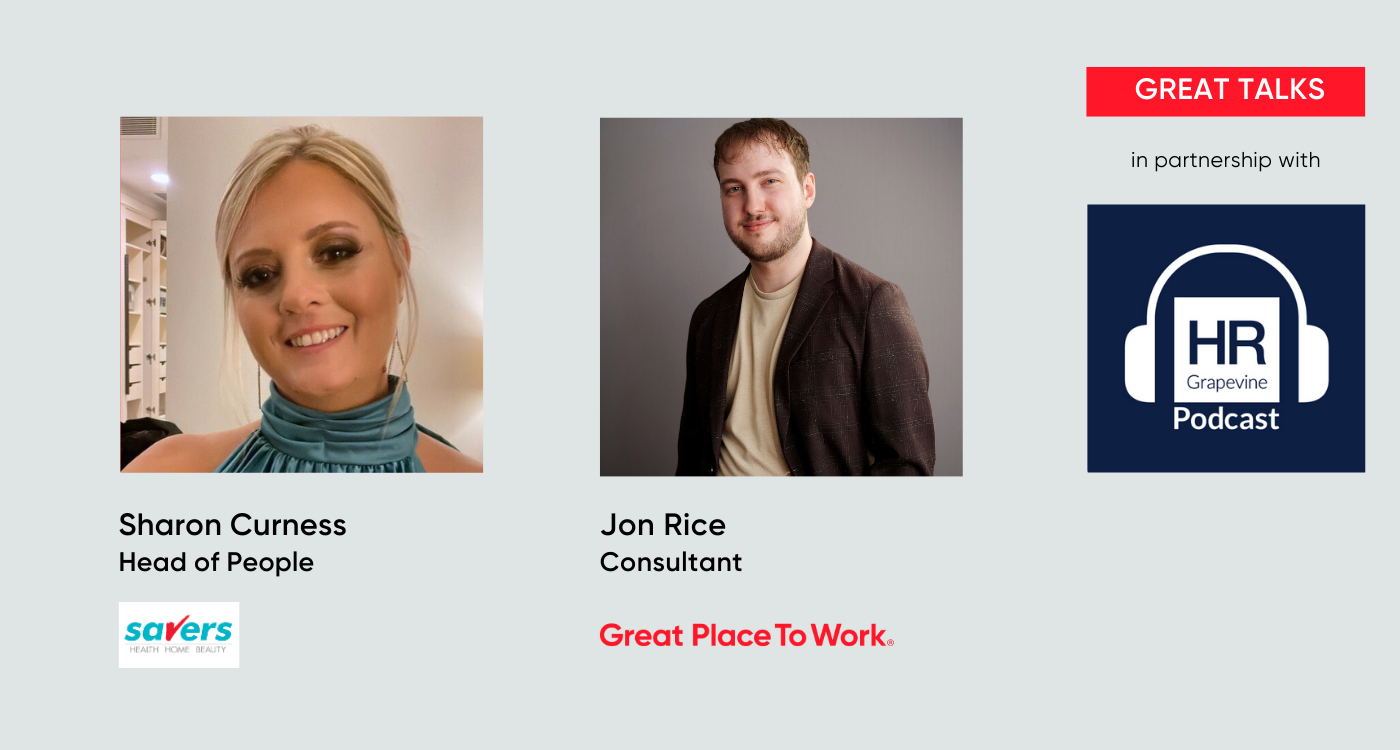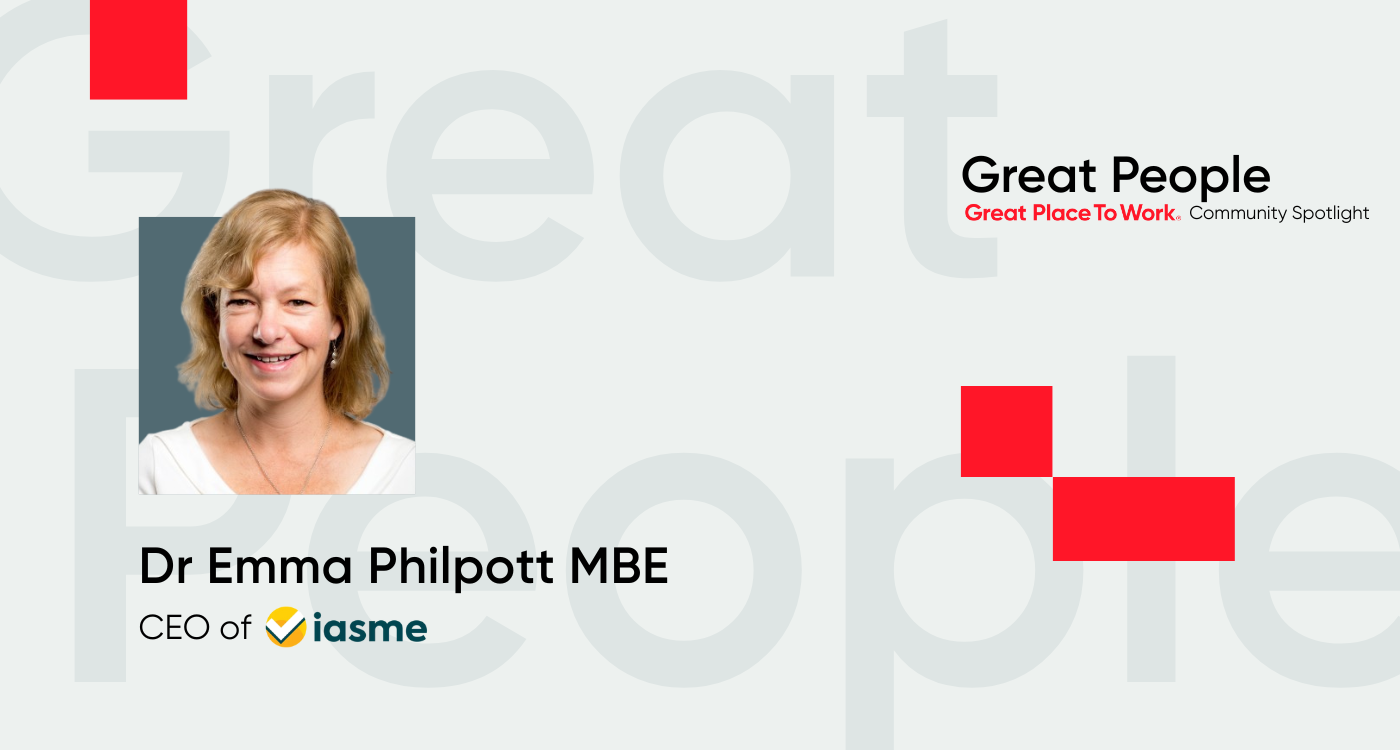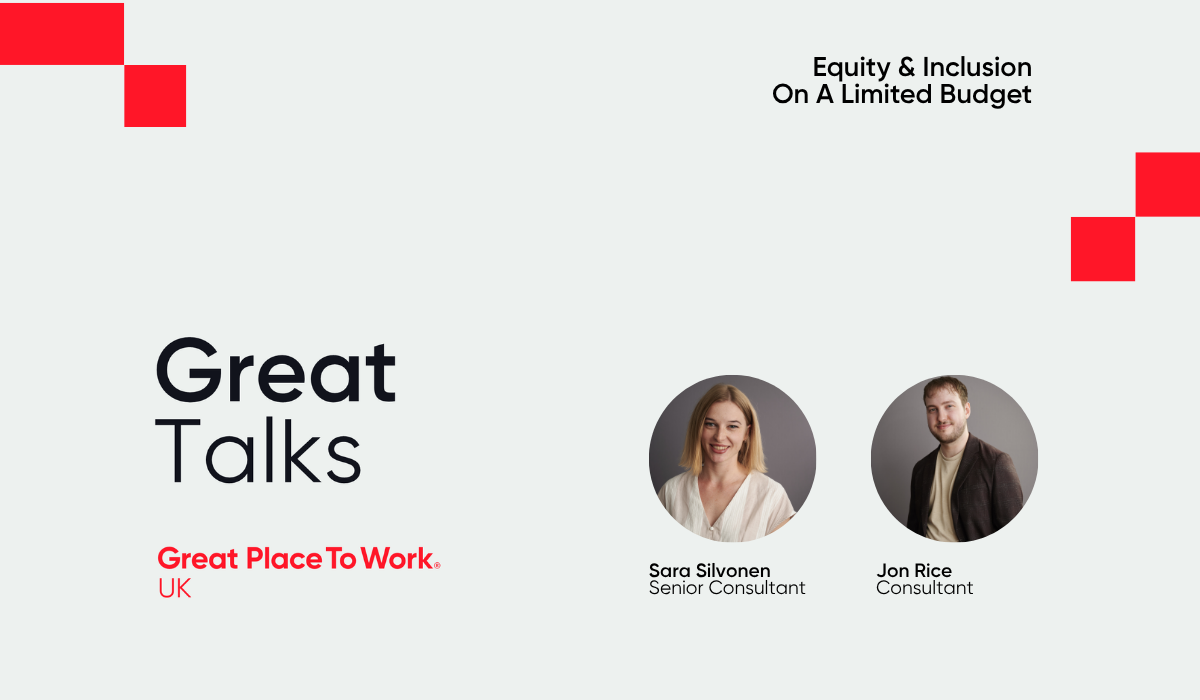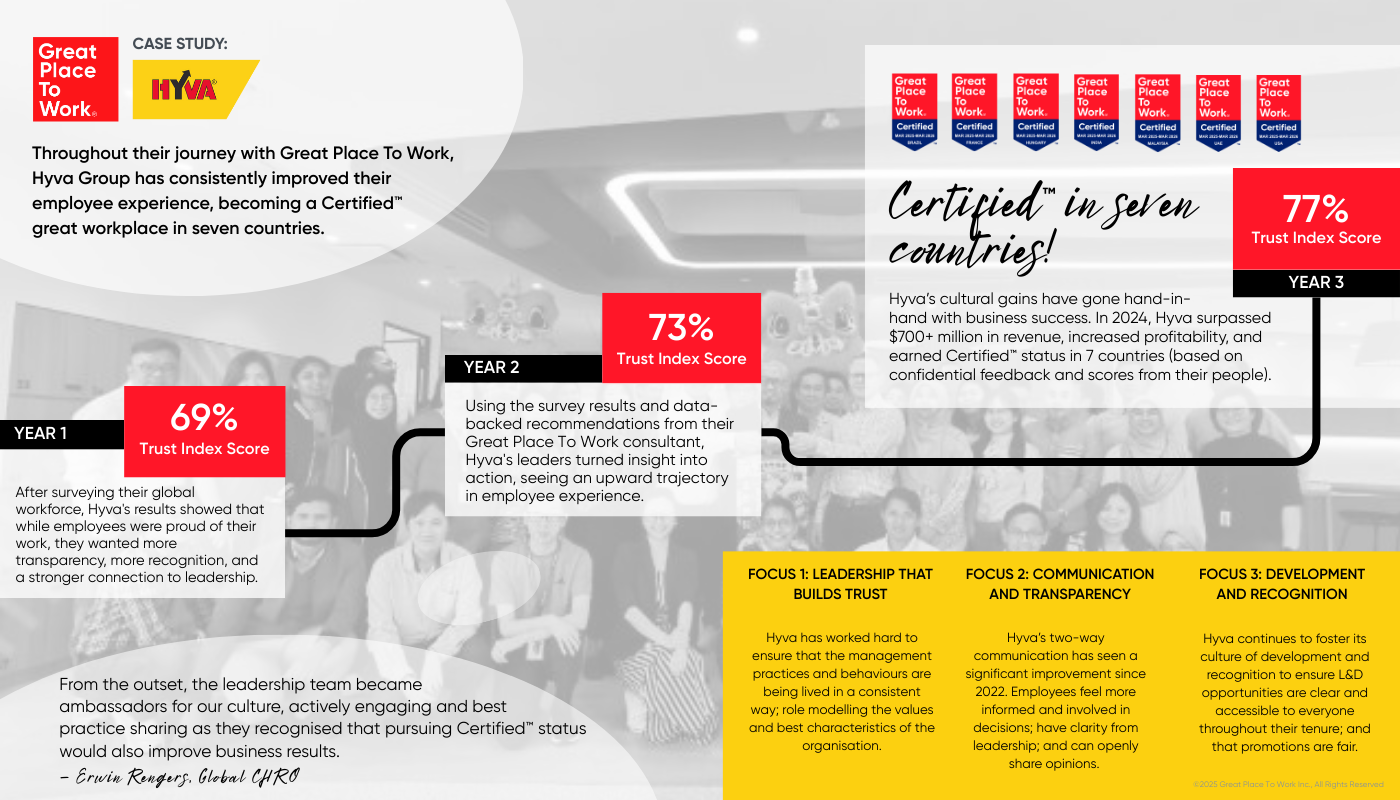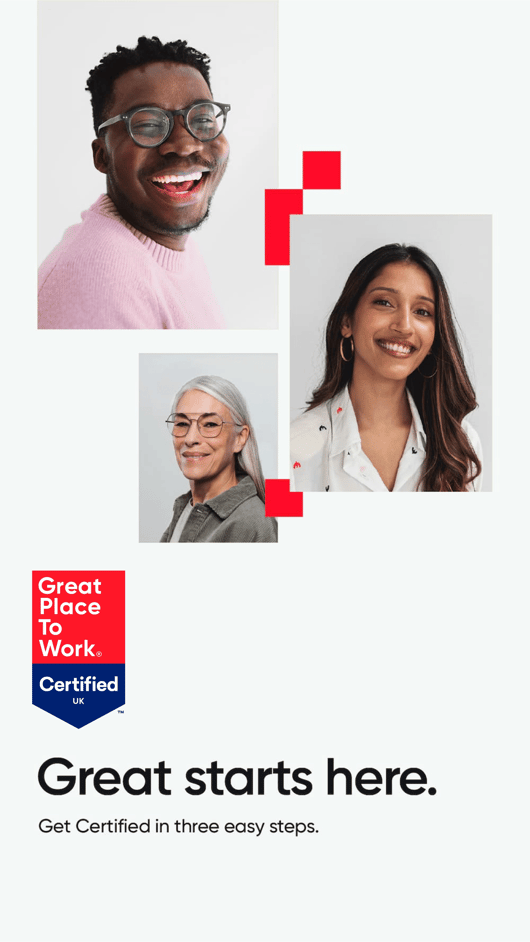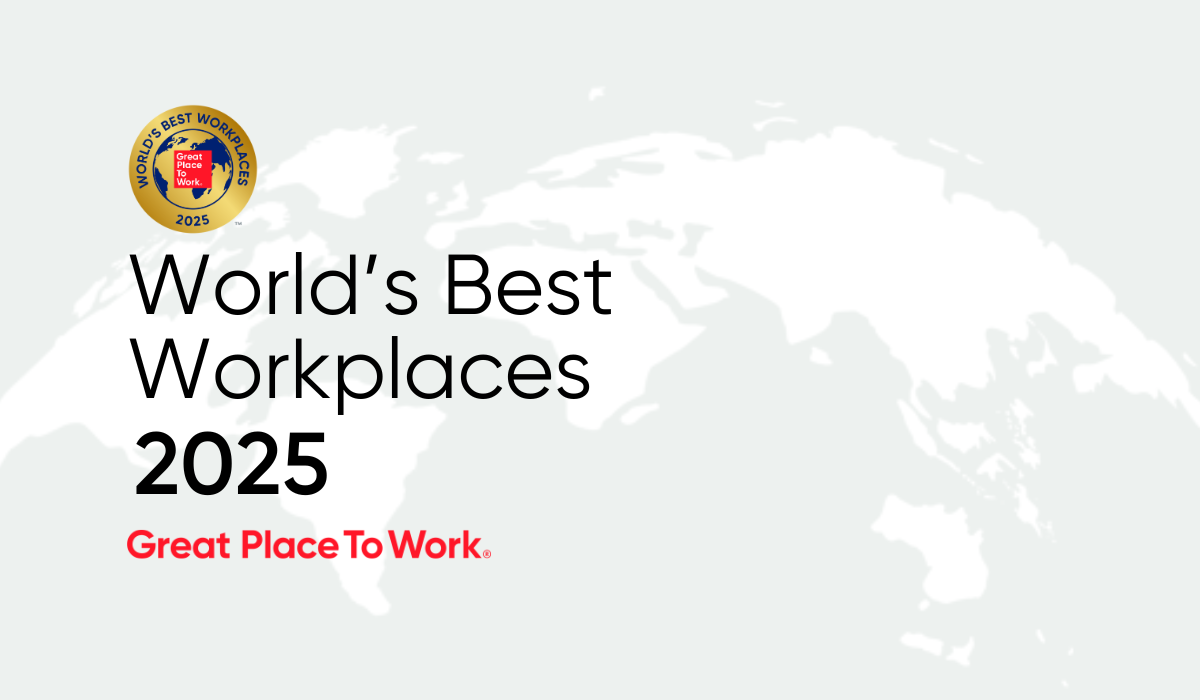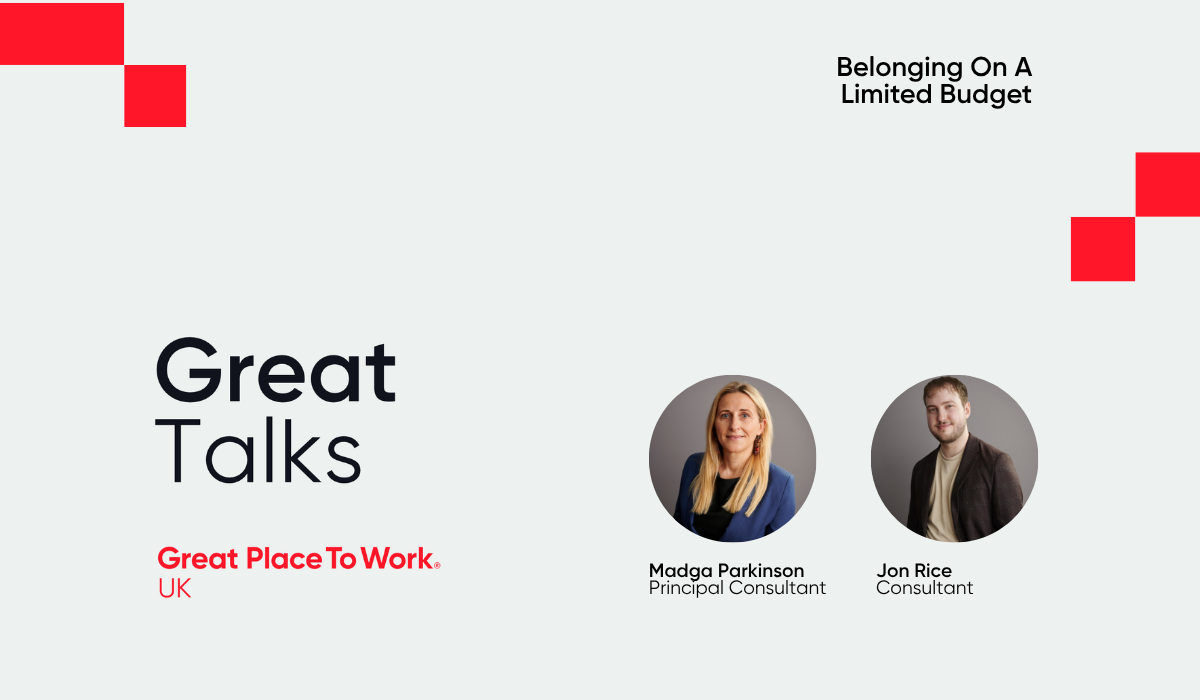In this final installment of our special podcast series with HR Grapevine, we speak to one of the UK's Best Workplaces in Retail, Hospitality & Leisure™ to find out how the company successfully created a culture of belonging and high-trust leadership that's made all their employees love where they work.
Episode 3 Key Takeaways
In this episode, Shalagh Fredericks, Head of Content at Great Place To Work UK is joined by guests:
- Sharon Curness, Head of People at Savers Health and Beauty
- Jon Rice, Consultant at Great Place To Work UK
In case you missed it | Episode 1 ft. Admiral Group + Booking.com
In case you missed it | Episode 2 ft. Unigloves + Unum
During their conversation, guests reflected on how Savers' people-centric culture has helped leaders develop a high-trust culture; small actions every company can take to foster an authentic culture of belonging; and what key areas people leaders should consider for 2025.
Sharon Curness, Head of People at Savers Health and Beauty – a UK's Best Workplace in Retail, Hospitality & Leisure 2024 – shared her take on:
How to build an authentic employer brand
We often say the biggest secret in Savers is what it's like to work here. And externally people don't see that, feel it or really understand it. So we wanted to really build the employer brand – something that's authentic and really means something to Savers, both internally and externally.
We started talking to the teams in stores and in head office around what is it like to work for Savers? What makes us different? What is it you like working here? And some of the things that they came back with were things like they love being here. So love came through really strongly. And actually, in our Great Place To Work survey last year when we first Certified™, the word love came through in our free comments.
...Our teams told us things like:
-
- 'I can be myself at work'
- 'You know what, I come to work, and it feels like a family.'
- 'I come to work because I love working with my team. It's the people here that, you know, are friends, and it's joyful working here.'
They [say] that they have a voice, that they can have ideas, and they can share them quite freely. And you hear many stories when we're out talking to them about what it's like working here, and how Savers took a chance on them and the team around them has supported them and really helped them grow.
So that's where love and virtue started to come from by teams telling us that Savers loves them, that they love working in Savers, and that they can really be themselves and Savers allows them to be who they are – so that's where that slogan came from.
And then we went back out and talked to the team around some of the words we were going to use in our employer brand. And we went out and asked our teams, as they wanted to be part of it. And we were blown away, really, by the amount of people that came forward and said they wanted to be part of the photoshoots; part of the branding; and sharing statements and slogans with us of, you know, 'Savers feels like home', things that they wanted us to include. So we were really, really delighted.
So everything you see in Savers – in our careers website, in our employer branding – is all actually our team's wording. It's all around our team's pictures, and they're all quite authentic... So it's in everything that we do right down to our presentation documents and the formats that we use. And we have a SharePoint system here in our business, where we share the graphics, the logos, the slogans with the whole business. And if somebody's creating something, then they can feel free to go into the SharePoint and and pick those up, and it becomes visible in our commercial presentations or operations. It filters through that work – it's in everything we do.

'Back to the Floor' scheme
Trust is huge, and we recognise that at Savers. We want our teams to show that they have high trust. They can be themselves at work, and they can absolutely share ideas and viewpoints. And we will listen and take that into account. And if they're great viewpoints, which most of them are, then we'll action them and take them forward.
...So that connection to our teams, that personal touch, is really important for us – right from our CEO, MD, right the way down to the sales floor with our Sales Assistants.
We'll ask questions to seek to understand rather than ask questions to already know the answer. So when we go into shops, we will have lots of open questions with some probing questions to get the real answers. And then when our teams give us the real answers, and give us some suggestions and ideas, we go away and action it. Then we will account that action back to where it came from. So if it's from, you know, one of the local stores or a store in Scotland, we'll account that back to where it came from and give it credit where it's quite rightly deserved.
And from that, one of the initiatives that we have is our 'Back to the Floor' scheme. So we run it a couple of times a year, which is where our head office teams and our store teams go back to the floor. Now we don't just go back to store for the sake of going back to store. We choose really difficult times, which is normally our promotions – when we launch some great offers, so great prices, but that comes with a lot of hard work for our store teams.
It means they get an influx of lots of stock that they need to move around, or take the deliveries in, move from the back to the floor, put into the promo locations, change the ticketing, change the point of sale. And that's a lot of hard work to get that done overnight, or first one's in the morning, to be ready for the customers in the next day.
And so we ask our head office and our field teams to go back when it's promotion. And what we do is we roll our sleeves up and we help. But as we're helping, we're also seeing some of the actions that we do in head office that impact our teams and drive more tasks. And we come back to the office and we almost have a 'What could we have done better for our store teams? What could we have made simpler? What could we do to take time away to make that easier for the teams?'
'We Love Ideas' scheme
'We Love Ideas' is a scheme where our teams can use a QR code in store to talk to us. So sure, talk to the area managers, or when we're in stores, talk to us. But it's as easy as there is also a QR code they can scan or put their ideas through – whatever the idea is.
Whether it's a new product that they've seen somewhere else that they think our customers would love, and they'd like to see; to whether it's an idea or a process that would to make their lives easier; or something they think we've just not considered.
So we get lots of ideas come through, and then we, as a head office team, take those ideas to the relevant function and talk them through an action in where we can. But at the very least, we go back to the store team with 'This is a great idea. It's in motion' or 'We're unable to do it.' And we tell them why we're unable to do it, or why that's not able to happen.
'Happy Teams. Happy Customers. Happy Days'
This is a concept that we use. It's a very strong visual across our business. It is very simply a roundel with the Savers logo in the middle with our tick. And then it says 'Happy Teams, Happy Customers, Happy Days' around the the circle. So very, very simple on the eye.
-png.png?width=350&height=353&name=Happy%20Teams%20(6)-png.png)
I've been here over 5 years, and it's been around certainly since I've been here. So it came from the Savers ethos about putting the teams at the heart of everything that we do. And our MD will use it to describe how we do things in Savers. So everything we do starts with the team.
If our teams are happy, we've got the right resource, the right level of training with our teams. They actually know what they're doing. We've communicated with them. We'll brief them. Then our teams will deliver great service to our customers, and delight our customers, so our customers will be happy.
If our customers are happy, and they're buying our products and they're getting great service, then this will lead to happy days, which is our KPI and our financials. And we often relay that to our teams around their bonus day, when they get bonus paid. But I guess it's a really simple process we use in everything we do, whether it's a new project or a new initiative that we're launching.
...In retail, we like to keep things very simple and so that it's relatable. People understand it because if they have those two pieces and they understand where they fit in, then they're able to deliver it and drive it forward, and be proud of what it delivers.
Focus areas for 2025
Of course, we'll continue to look at our culture and make sure that our culture continues to stay strong. But one of the areas, I think, for us next year, is to look at our team's skills for the future – to help them with [answering the challenge of] 'How do we drive the digital space? 'How do we continue to drive the mental health conversations?'.
And we've got a whole plan of how we take mental health training to our stores. We've trained store managers this year, and next year is how do we drive that even further.
And when we talk about future skills it's: How do we look at that connection with our customers, and the connection with our teams, and to make sure we continue to drive that connection?
And for us, that's going to be massively through our Unlearn campaign. So there's an Unlearn video that we developed earlier this year. Again, with our teams. So it's all our teams that in a part of our video. This lives on our career site, but simply it's about how we continue to to learn together, but unlearn prejudice, so yeah, that's a big focus for us next year.
Jon Rice, Consultant at Great Place To Work UK shared insights and data around:
How to help employees feel a stronger sense of belonging at work:
So at Great Place To Work, we operate on a For All™ model – and by this we mean: we want everyone at every organisation really to feel like they belong.
And the key word is consistently as well. We both want it consistent in terms of all the time, but also for all employees, consistent in terms of everyone.
So it is great to see an organisation like Savers with thousands of employees score and report that 81% of them feel like they belong there at Savers. It can be hard for organisations so large to really connect to all employees, and ensure that feelings of belonging permeate through to all employees.
Various initiatives that I've seen from organisations across many different sectors and sizes that create and foster these stronger feelings of belonging, including:
- Empowering Employee Resource Groups – so that employees can have a community, within the wider organisational community of people, who have similar backgrounds to them. And they can support and empower each other and really kind of share the burden of being a diverse person, and educate both each other, but also the wider employee base as well, and have that supportive community.
- Giving employees a platform to share some short-form videos – perhaps just a few minutes long, discussing their lived experiences; sharing their perspectives; and taking that moment to educate their colleagues on who they are as a person, and how their experiences have shaped their sort of worldview, both inside the workplace, but also outside the workplace as well. And the challenges that may come in hand with that, and the benefits as well.
- Having dedicated Teams or Slack channels for employees to share personal updates rather than just work updates – these can be for those really big and exciting things like weddings or childbirth, sharing those big moments with your colleagues, but also for smaller things like holidays or just pet pictures or even things like discussions of the latest TV show to release. It really gives employees that feeling of being able to talk to their colleagues in the workplace, but not just about work. And fosters those connections [as people] find similar interests and really celebrate each other, which is one of the key foundations to building that sense of belonging – this feeling that you can connect with your colleagues.
And similarly to this, leaders need to champion diversity, equity, inclusion and belonging, and role-model what inclusive behaviours look like at their organisation, and really set the tone for the rest of the employee base as well.
Why trust is so critical to a great workplace
Low trust leads to low engagement. And if employees are not engaged in the organisation, they are going to make less of an effort to act inclusively. And they'll likely be more in a sort of 'every man for himself' sort of mode, where they're entirely focused on their work, and their experiences at work first, before helping anyone else there. And this is because they don't trust their leaders to have their best interests at heart.
So if there's not that relationship of trust between the employee and the leadership, they won't buy into things as well. In those low trust organisations, any attempt to work on DEIB will often be seen as a tick box exercise. And employees won't really believe that leadership are acting with a sincere interest, and a set intent to improve. They'll think it's just a sort of marketing piece, or to cover some statutory tick box and thing.
And I have seen this myself as well – going into lower trust organisations to talk about DEIB and do workshops. I've had employees approach me afterwards with a sentiment of, "Oh, thank you for your work today, but leadership won't follow-up on this. They never do, so you've kind of wasted your time."
What should HR prioritise in 2025?
I would say it's probably the relationship between wellbeing and DEIB. It's becoming increasingly something that I'm seeing in a lot of different areas where DEI and wellbeing are being linked up and being recognised as being intrinsically linked to both each other.
And organisations themselves are starting to marry up their DEI and their wellbeing strategies. In a lot of organisations, these are two separate leads, sometimes separate departments entirely. And so there's that move to bring them together and really recognise that they work better when they're married up as one package rather than two disparate things.
Because after all, DEIB, at its core, is about ensuring that everyone's wellbeing is protected, regardless of their demographics or who they are. Otherwise, the wellbeing strategy that's not inclusive will miss people out, and fail to work for all employees.
Missed Episode 2? Listen to the conversation
In our previous episode, leaders from PPE manufacturer Unigloves and employee benefits provider Unum share key people practices and insights into how leaders can enable all their employees to thrive.
